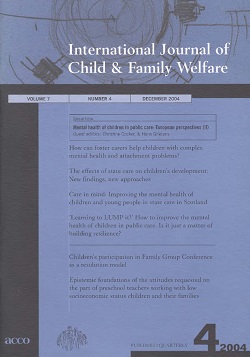The effects of state care on children's development: New findings, new approaches
Keywords:
institutional upbringing, social development, infants, children, adolescents, state care, residential careAbstract
In recent years there has been a continuing accumulation of evidence showing the importance of deprivation and disadvantage as influences on children's psychological development. Bowlby's (1951) original arguments on that area have been amply confirmed. The situation in Greek institutions differs in important aspects from that of other countries. They have a substantial stability in staffing. Many children are placed in residential group care for social and economic reasons rather than for disturbed family circumstances and a large number of children enter institutions in middle childhood. In addition, some children are admitted to residential group care from birth and by the age of two years they are adopted. These conditions provided the opportunity to study the outcomes of children admitted to group care from less adverse home circumstances. A series of research projects have been conducted in Greece during the last 20 years. The findings from these studies are presented in the present paper thereby providing new evidence on the effects of institutional upbringing on children's development. The findings showed that institutionalized infants formed, to a large extent, a disorganized type of attachment with their caregiver similar to that found in high risk infants not living in institutions. The Greek studies have also shown that the effects of residential group care on children are, to a large extent, influenced by the children's experiences prior to admission. More specifically, disturbance is more likely to occur when the child has experienced parental separation or divorce before insitutionalization. Furthermore, age of admission was also found to be an important factor influencing the effects of group care. Children admitted to residential group care before the age of 2 1/2 years were more adversely affected by group care rearing. The effects of institution rearing are evident up until adulthood and there seems to be an intergenerational continuity in the cycles of deprivation and
disadvantage.

